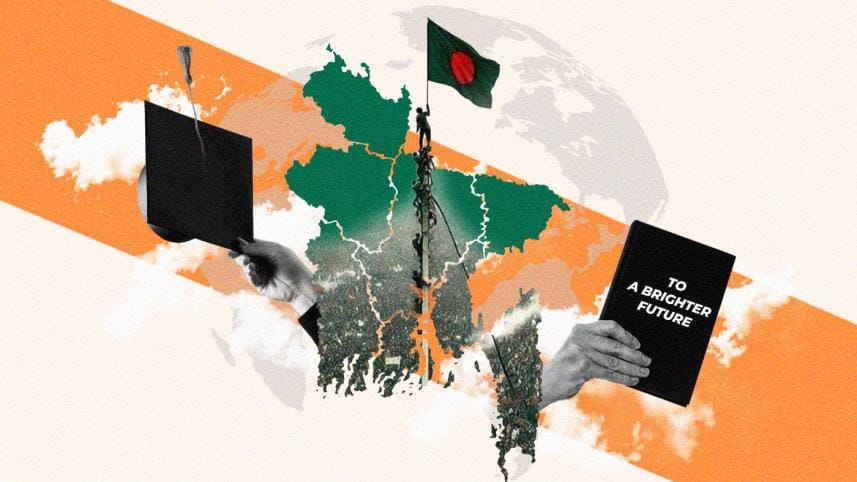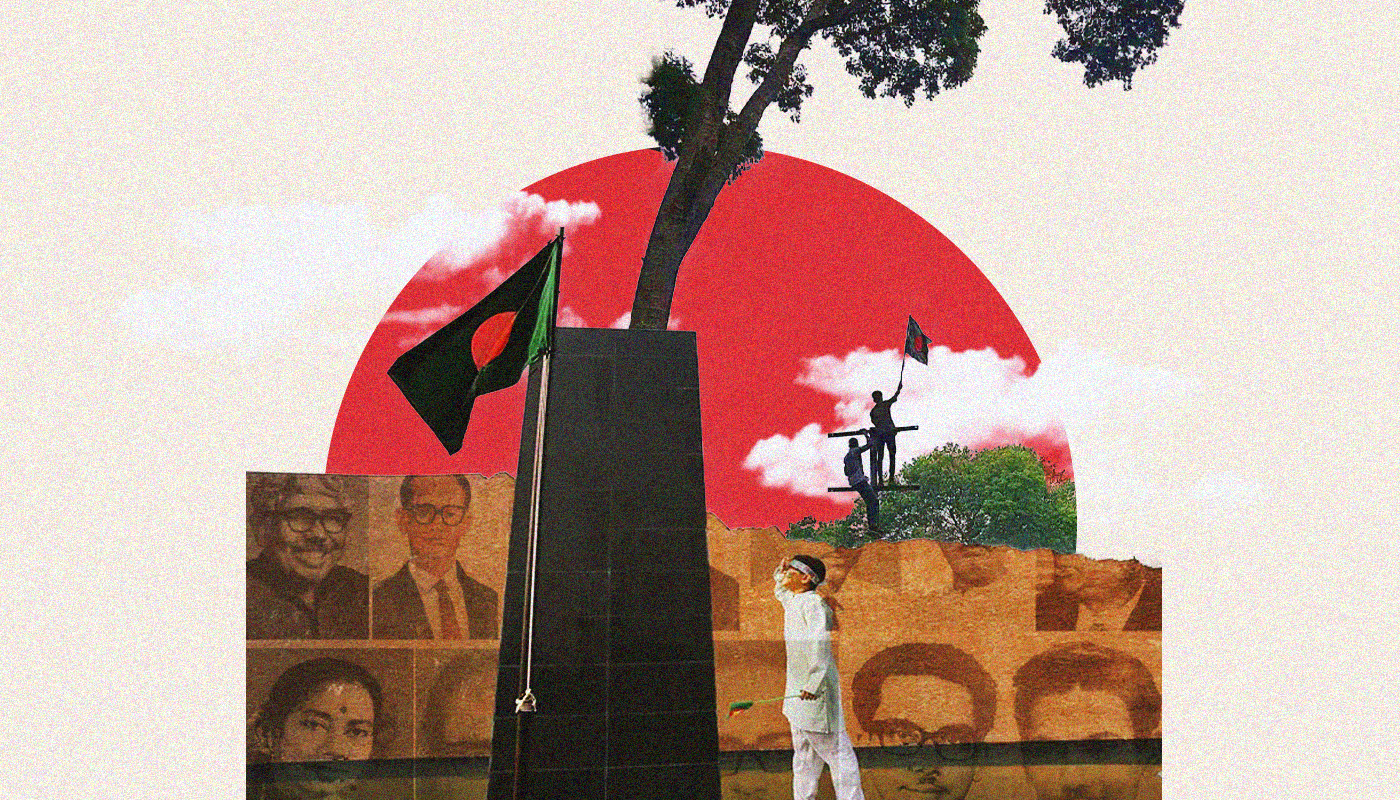From crisis to change: The right education can sustain the revolution

Let's take a moment to reflect on the remarkable year of 2024 as we approach its final act. Our national annals will remember 2024 as a conduit of change. The 53-year-old country shook off its midlife crisis and reinvented itself. The spark that came from students spread as a flame of mass uprising. The gale, akin to Kazi Nazrul Islam's poetic nor'wester, swept away the old and breathed new life into the stagnant system. The flag of a new beginning heralds new possibilities. But history tells us that revolutions don't sustain themselves. For changes to happen, we need a structural base and a superstructural vision. Education can help us attain such long-term, systemic, and sustainable change.
The call for reform started with a desire to end all discriminatory practices. The mass endorsed the demand through their wholehearted participation, toppling the regime that had alienated itself from the people with its partisan politics and industrial-scale corruption. Equity, therefore, must be the guiding principle of all reforms, including education. However, the delay by the interim government in forming an education commission suggests a tendency to reclaim politics from the vantage point of those close to the power centre. The reformers' fixation on ideological purity became apparent when they challenged the credentials of certain members of a proposed committee. Rewriting history to suit one agenda is a policy of the old. The new government must be forward-looking enough to craft an education system that equips students for a rapidly changing, complex, interconnected world.
Standing on the isthmus of change, we must avoid any form of myopia. We need to realise that by the time our students graduate, they will be competing on a global platform for jobs that don't even exist today. Given the exponential growth of technology over the last decade, it is clear that the frontiers our youth will inhabit a decade from now will be drastically different from our current ones. Our educational policies, therefore, need to find the right balance between accessibility and global immersion. There is no reason why we cannot envision our youth as world players. Recent ethnicity-based GCSE results placed Bangladeshi students only after Chinese and Indians. The data shows that given the right opportunities, our youth can deliver at the highest level.
The challenge for us is to create a condition where our students are motivated enough to learn. The ongoing wave of change has resulted in a sense of false empowerment and a disregard for institutional authority. By forcing authorities to publish half-baked results, cancel HSC examinations, ransack colleges, or oust teachers, enough damage has been inflicted to give students the false impression that they can chase illogical terms. The feeling that students learn more from the web has reduced the authority of both schools and textbooks. As educators, the challenge for us is to create a pull factor that makes schools and education relevant for our students. The shadow structure that thrived outside the school system promoted coaching businesses and notebooks. Then there was this tempting idea that privileges skill over knowledge. In a country where nearly 28 percent of tertiary-educated youth are unemployed (2022), it was convenient for the government to champion entrepreneurship and skill-based courses for self-employment. It's quite fashionable to cite successful university dropouts like Bill Gates and Mark Zuckerberg to encourage students to start their own businesses, oblivious to the fact that most startups fail. We rarely acknowledge that even the renowned entrepreneurs met the required high scores for admission into the world's top universities. There is no substitute for a strong educational base at primary and secondary levels before one ventures out to pursue passion or hone skills.
The previous government tried to bring in change by following a model from a culturally homogenous Scandinavian country with a strong Protestant work ethic. Traditionally, Finland prides itself on the best scores in the Programme for International Student Assessment (PISA). Countries across the world tried to replicate the creative model to inculcate a sense of lifelong learning in their students. In Bangladesh, high-paid experts persuaded the previous government of the model's potential, shielding the fact that Finland's model is experiencing a decline in success. The influx of immigrants has challenged the model, which relies on the highest standards of pedagogical practices, social democracy, and cultural homogeneity for its survival. In contrast, countries like Türkiye and Chile, which have incorporated indigenous models, have yielded better results in recent years.
The current government's task is to adopt a locally rooted but globally connected education model. The reformed curriculum should ensure that students from all socioeconomic backgrounds have access to quality education, bridging the gaps that currently exist not only in rural and urban areas but also in the three-pronged Bangla-English-madrasa systems. Equity also demands an objective representation of the nation's past, fostering a balanced understanding of history that can withstand political transitions. By embedding equity into the ethos of education reform, we can create a system that is resilient, inclusive, and forward-thinking, sparing future generations from the turmoil of abrupt and ideologically driven changes.
By promoting the success of Bangladeshis abroad, we can go beyond the myopic vision of thinking of ourselves within the deltaic confines. Bangladeshi-origin students in the United Kingdom outperform their peers, with only Chinese and Indian students surpassing them. This is not a fluke; it is the result of a structured, inclusive education system that prioritises competency and equal opportunity. It pains me to reflect on the stark contrast between Bangladeshi students excelling abroad and those floundering within our own borders. The pain intensifies when you consider that our students are falling behind without any personal fault. Their poor performance in literacy and numeracy skills is largely due to an education system that is plagued by abrupt and ill-conceived reforms, which are rolled out without adequate research or preparation. The education system leaves untrained and underpaid teachers to grapple with new methods. Students bear the brunt of this chaos. Petty interests such as commercial benefits and political gains exacerbate the situation.
We can learn our lessons from the Global South. Countries like Vietnam and South Korea have modernised their systems while remaining rooted in their cultural contexts. We must chart a similar path, combining global best practices with our indigenous realities. Our national vision should be ambitious yet grounded, aiming to produce informed, capable global citizens prepared for the challenges of the tech-driven world. The curriculum of the National Curriculum and Textbook Board (NCTB) rightly prioritised critical thinking, technological proficiency, and a deep understanding of our own cultural heritage in its framework. However, the textbooks failed to translate the policies, exposing our inability to generate content and develop materials.
As we step into 2025, let this moment of upheaval galvanise us to action. Our students' revolution demands more than just rhetoric; it demands real, sustained change. Let's honour their bravery and vision by establishing an education system that fosters their potential and ensures a brighter future for Bangladesh. Now that the storm has passed, we must rebuild with purpose and clarity.
Dr Shamsad Mortuza is professor of English at Dhaka University.
Views expressed in this article are the author's own.
Follow The Daily Star Opinion on Facebook for the latest opinions, commentaries and analyses by experts and professionals. To contribute your article or letter to The Daily Star Opinion, see our guidelines for submission.




 For all latest news, follow The Daily Star's Google News channel.
For all latest news, follow The Daily Star's Google News channel. 

Comments